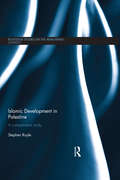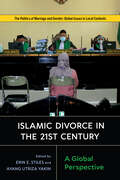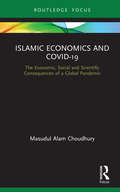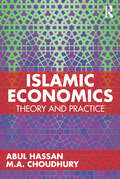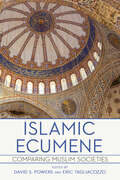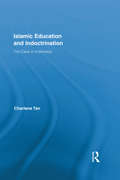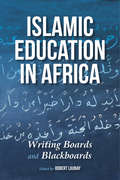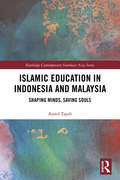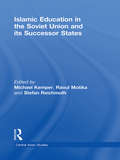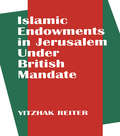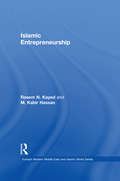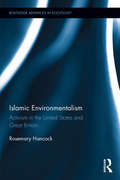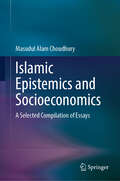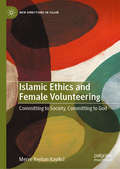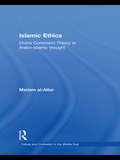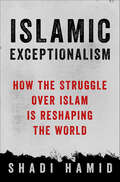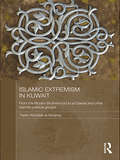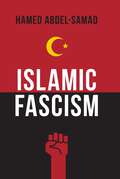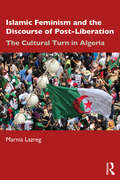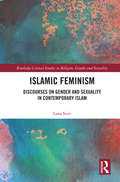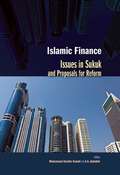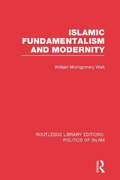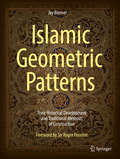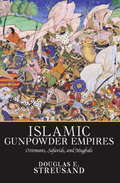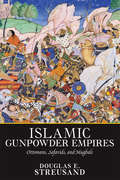- Table View
- List View
Islamic Development in Palestine: A Comparative Study (Routledge Studies on the Arab-Israeli Conflict)
by Stephen RoyleThis book assesses the capabilities of an Islamic approach in aiding self-organisation by examining the case of the occupied Palestinian territories in conjunction with a comparative analysis of four other nations. Three main mechanisms of Islamic development are explored; finance, microfinance and charity. Identifying the need to recognise the non-linear nature of societal interaction at the individual, community and state levels, the book uses complexity theory to better understand development. It assesses the role of Islamic development at macro and micro levels and identifies issues with rigid and hierarchical policy making.
Islamic Divorce in the Twenty-First Century: A Global Perspective (Politics of Marriage and Gender: Global Issues in Local Contexts)
by Dorothea Schulz Elisa Giunchi Katherine Lemons Erin E. Stiles Ayang Utriza Yakin Nathalie Bernard-Maugiron Fatima Essop Fulera Issaka-Toure Jean-Michel Landry Souleymane Diallo Rune Steenberg Nadia HussainIslamic Divorce in the 21st Century shows the wide range of Muslim experiences in marital disputes and in seeking Islamic divorces. For Muslims, having the ability to divorce in accordance with Islamic law is of paramount importance. However, Muslim experiences of divorce practice differ tremendously. The chapters in this volume discuss Islamic divorce from West Africa to Southeast Asia, and each story explores aspects of the everyday realities of disputing and divorcing Muslim couples face in the twenty-first century. The book’s cross-cultural and comparative look at Islamic divorce indicates that Muslim divorces are impacted by global religious discourses on Islamic authority, authenticity, and gender; by global patterns of and approaches to secularity; and by global economic inequalities and attendant patterns of urbanization and migration. Studying divorce as a mode of Islamic law in practice shows us that the Islamic legal tradition is flexible, malleable, and context-dependent.
Islamic Economics and COVID-19: The Economic, Social and Scientific Consequences of a Global Pandemic (Routledge Focus on Economics and Finance)
by Masudul Alam ChoudhuryThis book is a timely exploration of an unprecedented, cataclysmic pandemic episode. It examines certain critical aspects of socio-scientific theory across a variety of diverse themes, and through an epistemic lens. The book investigates the general theory of pandemic episodes and their adverse long-term effects on human and environmental wellbeing. It includes an in-depth study of COVID-19 but also looks to the future to contemplate potential pandemics to come. The existing approach to the study of pandemics is critically examined in terms of the prevalent isolated and thus mutated way of viewing human and mechanical relations in the name of specialization and modernity. The book presents a novel model of science-economy-society moral inclusiveness that forms a distinctive theoretical approach to the issue of normalizing all forms of pandemic challenges. It is methodologically different from existing economic theory, including the critical study of microeconomic foundations of macroeconomics. Human and environmental existence along with its multidisciplinary outlook of unity of knowledge between modernity, traditionalism, and socio-cultural values is emphasized in the treatment and cure of pandemic episodes. The book is a unique reference work, offering fresh wisdom within the moral methodological worldview.
Islamic Economics: Theory and Practice
by Abul Hassan M.A. ChoudhuryThis book is a comprehensive study, which provides informed knowledge within the field of Islamic economics. The authors lay down the principal philosophical foundation of a unique and universal theory of Islamic economics by contrasting it with the perspectives of mainstream economics. The methodological part of the theory of Islamic economics arises from the ethical foundations of the Qur'an and the Sunnah (tradition of the Prophet) along with learned exegeses in an epistemological derivation of the postulates and formalism of Islamic economics. This foundational methodology will be contrasted with the contemporary approaches of the random use of mainstream economic theory in Islamic economics. The book establishes the methodological foundation as the primal and most fundamental premise of the study leading to scientific formalism and the prospect of its application. By way of its Islamic epistemological explanation (philosophical premise) in the form of logical formalism and the use of simple real-world examples, the authors show the reader that the scientific nature of economics in general and Islamic economics in particular rests on the conception of the scientific worldview. With its uniquely comparative approach to mainstream economics, this book facilitates a greater understanding of Islamic economic concepts. Senior undergraduate and graduate students will gain exposure to Islamic perspectives of micro- and macroeconomics, money, public finance, and development economics. Additionally, this book will be useful to practitioners seeking a greater comprehension of the nature of Islamic economics. It will also enable policymakers to better understand the mechanism of converting institutions, such as public and social policy perspectives.
Islamic Ecumene: Comparing Muslim Societies
by David S. Powers and Eric TagliacozzoThe essays in Islamic Ecumene address the ways in which Muslims from Morocco to Indonesia and from sub-Saharan Africa to the steppes of Uzbekistan are members of a broad cultural unit. Although the Muslim inhabitants of these lands speak dozens of languages, represent numerous ethnic groups, and practice diverse forms of Islam, they are united by shared practices and worldviews shaped by religious identity. To highlight these commonalities, the co-editors invited a team of scholars from a wide range of disciplines to examine Muslim societies in comparative and interconnected ways. The result is a book that showcases ethics, education, architecture, the arts, modernization, political resistance, marriage, divorce, and death rituals. Using the insights and methods of historians, anthropologists, literary critics, art historians, political scientists, and sociologists, Islamic Ecumene seeks to understand Islamic identity as a dynamic phenomenon that is reflected in the multivalent practices of the more than one billion people across the planet who identify as Muslims.
Islamic Education and Indoctrination: The Case in Indonesia (Routledge Research in Education)
by Charlene TanIslamic schools, especially madrasahs, have been viewed as sites of indoctrination for Muslim students and militants. Some educators and parents in the United States have also regarded introductory courses on Islam in some public schools as indoctrinatory. But what do we mean by "indoctrination"? And is Islamic education indoctrinatory? This book critically discusses the concept of indoctrination in the context of Islamic education. It explains that indoctrination occurs when a person holds to a type of beliefs known as control beliefs that result in ideological totalism. Using Indonesia as an illustrative case study, the book expounds on the conditions for an indoctrinatory tradition to exist and thrive. Examples include the Islamic school co-founded by Abu Bakar Ba’asyir and the militant organisation Jemaah Islamiyah. The book further proposes ways to counter and avoid indoctrination through formal, non-formal, and informal education. It argues for the creation and promotion of educative traditions that are underpinned by religious pluralism, strong rationality, and strong autonomy. Examples of such educative Muslim traditions in Indonesia will be highlighted. Combining philosophical inquiry with empirical research, this book is a timely contribution to the study of contemporary and often controversial issues in Islamic education.
Islamic Education in Africa: Writing Boards and Blackboards
by Robert LaunayWriting boards and blackboards are emblematic of two radically different styles of education in Islam. The essays in this lively volume address various aspects of the expanding and evolving range of educational choices available to Muslims in sub-Saharan Africa. Contributors from the United States, Europe, and Africa evaluate classical Islamic education in Africa from colonial times to the present, including changes in pedagogical methods--from sitting to standing, from individual to collective learning, from recitation to analysis. Also discussed are the differences between British, French, Belgian, and Portuguese education in Africa and between mission schools and Qur'anic schools; changes to the classical Islamic curriculum; the changing intent of Islamic education; the modernization of pedagogical styles and tools; hybrid forms of religious and secular education; the inclusion of women in Qur'anic schools; and the changing notion of what it means to be an educated person in Africa. A new view of the role of Islamic education, especially its politics and controversies in today's age of terrorism, emerges from this broadly comparative volume.
Islamic Education in Indonesia and Malaysia: Shaping Minds, Saving Souls (Routledge Contemporary Southeast Asia Series)
by Azmil Mohd TayebDespite their close geographic and cultural ties, Indonesia and Malaysia have dramatically different Islamic education, with that in Indonesia being relatively decentralized and discursively diverse, while that in Malaysia is centralized and discursively restricted. The book explores the nature of the Islamic education systems in Indonesia and Malaysia and the different approaches taken by these states in managing these systems. The book argues that the post-colonial state in Malaysia has been more successful in centralising its control over Islamic education, and more concerned with promoting a restrictive orthodoxy, compared to the post-colonial state in Indonesia. This is due to three factors: the ideological makeup of the state institutions that oversee Islamic education; patterns of societal Islamisation that have prompted different responses from the states; and control of resources by the central government that influences centre-periphery relations. Informed by the theoretical works of state-in-society relations and historical institutionalism, this book shows that the three aforementioned factors can help a state to minimize influence from the society and exert its dominance, in this case by centralising control over Islamic education. Specifically, they help us understand the markedly different landscapes of Islamic education in Malaysia and Indonesia. It will be of interest to academics in the field of Southeast Asian Studies, Asian Education and Comparative Education.
Islamic Education in the Soviet Union and Its Successor States (Central Asian Studies)
by Michael Kemper Raoul Motika Stefan ReichmuthThis book provides a comparative history of Islamic education in the Soviet Union and the post-Soviet countries. Case studies on Ukraine, Azerbaijan, Kazakhstan, Uzbekistan, and Tajikistan and on two regions of the Russian Federation, Tatarstan and Daghestan, highlight the importance which Muslim communities in all parts of the Soviet Union attached to their formal and informal institutions of Islamic instruction. New light is shed on the continuity of pre-revolutionary educational traditions – including Jadidist ethics and teaching methods – throughout the New Economic Policy period (1921-1928), on Muslim efforts to maintain their religious schools under Stalinist repression, and on the complete institutional breakdown of the Islamic educational sector by the late 1930s. A second focus of the book is on the remarkable boom of Islamic education in the post-Soviet republics after 1991. Contrary to general assumptions on the overwhelming influence of foreign missionary activities on this revival, this study stresses the primary role of the Soviet Islamic institutions which were developed during and after the Second World War, and of the persisting regional and even international networks of Islamic teachers and muftis. Throughout the book, special attention is paid to the specific regional traditions of Islamic learning and to the teachers’ affiliations with Islamic legal schools and Sufi brotherhoods. The book thus testifies to the astounding dynamics of Islamic education under rapidly changing and oftentimes extremely harsh political conditions.
Islamic Endowments in Jerusalem Under British Mandate
by Yitzhak ReiterYitzhak Reiter presents a picture of the role of Islam in mandatory Jerusalem through the resources of the Waqf. The prevalent image of institutionalized corruption within the Waqf system is not completely supported by the findings of the study.
Islamic Entrepreneurship (Durham Modern Middle East and Islamic World Series)
by M. Kabir Hassan Rasem N. KayedThis book discusses the idea that there is a specific Islamic form of entrepreneurship. Based on extensive original research amongst small and medium sized enterprises in Saudi Arabia, it shows how businesses are started and how they grow in the context of an Islamic economy and society. It argues that as specific Islamic approaches to a wide range of economic activities are being formulated and implemented, there is indeed a particular Islamic approach to entrepreneurship. Examining the relationship between Islamic values and entrepreneurial activity, the book considers whether such values can be more effectively used in order to raise the profile of Islamic entrepreneurship, and also to promote alternatives to development in the contemporary business environment. The book analyses the nature of entrepreneurship, and the special qualities of Islamic entrepreneurship, and discusses how the Islamic approach to entrepreneurship can be encouraged and developed further still
Islamic Environmentalism: Activism in the United States and Great Britain (Routledge Advances in Sociology)
by Rosemary HancockIslamic Environmentalism examines Muslim involvement in environmentalism in the United States and Great Britain. The book focuses upon Muslim activists and Islamic organizations that approach environmentalism as a religious duty: offering environmental readings of Islamic scriptures, and integrating religious ritual and practice with environmental action. Honing in on the insights of social movement theory, Hancock predominantly examines the activism and experience of Muslims involved in environmentalism and bases her research on interviews with activists in the United States and Great Britain. Indeed, the reader is first provided with an insightful analysis of the ways in which Muslim activists interpret and present environmentalism—diagnosing causes of environmental crises, proposing solutions, and motivating other Muslims into activism. This is followed by a discussion of the importance of affective ties, emotion and group culture in motivating and sustaining Muslim involvement in environmental activism. A timely volume which draws attention to the synthesis of political activism and religious practice amongst Muslim environmentalists, this book will be of interest to undergraduates, postgraduates and postdoctoral researchers interested in fields such as Islamic Studies, Sociology of Religion, Social Movement Theory and Environmental Studies.
Islamic Epistemics and Socioeconomics: A Selected Compilation of Essays
by Masudul Alam ChoudhuryThis book presents selected essays on the epistemological foundation of the Islamic world-system, in the light of the exegesis of the Qur’an, to develop existing understandings of Islamic economics. A selection of key contributions by one of the world's leading figures working at the nexus of Islamic social sciences, Islamic philosophy, and Islamic economics, the book integrates applied foundations of Islamic economics and Islamic philosophy, presenting a critical outlook on the existing state of Islamic economics and Islamic finance, within a broader framework of socio-scientific enquiry, philosophical perspectives on Islam, and philosophy of science. The author confronts the absence of epistemic groundwork upon which any fresh social and scientific enquiry is developing in Islamic economics, casting the discussion within an explanatory framework of ‘the unity of knowledge’ as bestowed by Islamic monotheistic law, which substantively characterizes the generalization and details of ‘everything’. The present work unravels this objective methodology and its application with reference to a limited number of issues and problems in global economics. Complex and multidisciplinary in its treatment, this book presents the key arguments on mathematical, philosophical, and socio-scientific modes of inquiry in deriving, developing, and empirically applying the Qur’anic methodology of the “unity of knowledge” to economic problems. It is relevant to scholars and advanced students in social scientific studies of Islam, Islamic theology and philosophy, and Islamic economics and finance.
Islamic Ethics and Female Volunteering: Committing to Society, Committing to God (New Directions in Islam)
by Merve Reyhan KayikciThis book unpacks how the ethical is embodied through an examination of the lived experiences of female Muslim volunteers in Belgium. Kayikci draws on a wealth of interview material that sheds light on the ethical turn in the anthropology of Islam, exploring how volunteering enables the space and time for Muslim women to commit to both orthodox religious and civic social values. As volunteering and interacting (caring) with the society requires careful deliberation of their society and their position as Muslims, and as women in that society, this research unpacks how multiple belongings of Muslim women in Belgium are negotiated, balanced, and influenced. This analysis reveals how the everyday is informed by different epistemological traditions; both the liberal and the Islamic, and how these traditions make the life-worlds of the women. Islamic Ethics and Female Volunteering will be of interest to academics across religious studies, anthropology, sociology, gender studies and community studies, especially scholars working in the areas of ethics, migration, Muslims in Europe, volunteering and activism.
Islamic Ethics: Divine Command Theory in Arabo-Islamic Thought (Culture and Civilization in the Middle East)
by Mariam al-AttarThis book explores philosophical ethics in Arabo-Islamic thought. Examining the meaning, origin and development of "Divine Command Theory", it underscores the philosophical bases of religious fundamentalism that hinder social development and hamper dialogue between different cultures and nations. Challenging traditional stereotypes of Islam, the book refutes contemporary claims that Islam is a defining case of ethical voluntarism, and that the prominent theory in Islamic ethical thought is Divine Command Theory. The author argues that, in fact, early Arab-Islamic scholars articulated moral theories: theories of value and theories of obligation. She traces the development of Arabo-Islamic ethics from the early Islamic theological and political debates between the Kharijites and the Murji’ites, shedding new light on the moral theory of Abd al-Jabbar al-Mu’tazili and the effects of this moral theory on post-Mu’tazilite ethical thought. Highlighting important aspects in the development of Islamic thought, this book will appeal to students and scholars of Islamic moral thought and ethics, Islamic law, and religious fundamentalism.
Islamic Exceptionalism: How the Struggle Over Islam Is Reshaping the World
by Shadi HamidIn Islamic Exceptionalism, Brookings Institution scholar and acclaimed author Shadi Hamid offers a novel and provocative argument on how Islam is, in fact, "exceptional" in how it relates to politics, with profound implications for how we understand the future of the Middle East. Divides among citizens aren't just about power but are products of fundamental disagreements over the very nature and purpose of the modern nation state—and the vexing problem of religion’s role in public life. Hamid argues for a new understanding of how Islam and Islamism shape politics by examining different models of reckoning with the problem of religion and state, including the terrifying—and alarmingly successful—example of ISIS. With unprecedented access to Islamist activists and leaders across the region, Hamid offers a panoramic and ambitious interpretation of the region's descent into violence. Islamic Exceptionalism is a vital contribution to our understanding of Islam's past and present, and its outsized role in modern politics. We don't have to like it, but we have to understand it—because Islam, as a religion and as an idea, will continue to be a force that shapes not just the region, but the West as well in the decades to come.
Islamic Extremism in Kuwait: From the Muslim Brotherhood to Al-Qaeda and other Islamic Political Groups (Durham Modern Middle East and Islamic World Series)
by Falah Abdullah al-MdairesThis book is the first to provide a complete overview of Islamic extremism in Kuwait. It traces the development of Islamist fundamentalist groups in Kuwait, both Shiite and Sunni, from the beginning of the twentieth century. It outlines the nature and origins of the many different groups, considers their ideology and organization, shows how their activities are intertwined with the wider economy, society and politics to the extent that they are now a strong part of society, and discusses their armed activities, including terrorist activities. Although focusing on Kuwait, it includes overage of the activities of Islamist groups in other Gulf States. It also discusses the relation between Ruling Families with Islamist political groups, thereby demonstrating that the intertwining of Islamic ideology and armed activities with politics is not a new development in the region.
Islamic Fascism
by Hamed Abdel-SamadThis polemic against Islamic extremism highlights the striking parallels between contemporary Islamism and the 20th-century fascism embodied by Hitler and Mussolini. Like those infamous ideologies, Islamism today touts imperialist dreams of world domination, belief in its inherent superiority, contempt for the rest of humanity, and often a murderous agenda. The author, born and raised in Egypt and now living in Germany, not only explains the historical connections between early 20th-century fascist movements in Europe and extremist factions in Islam, but he also traces the fascist tendencies in mainstream Islam that have existed throughout its history. Examining key individuals and episodes from centuries past, the book shows the influence of Islam's earliest exploits on current politics in the Islamic world. The author's incisive analysis exposes the fascist underpinnings of the Muslim Brotherhood, Hamas, Hezbollah, the Shia regime in Iran, ISIS, Salafi and Jihadist ideologies, and more. Forcefully argued and well-researched, this book grew out of a lecture on Islamic fascism that the author gave in Cairo, resulting in a call for his death by three prominent Egyptian clerics.
Islamic Feminism and the Discourse of Post-Liberation: The Cultural Turn in Algeria
by Marnia LazregThis important study examines the cultural turn for women in the Middle East and North Africa, analyzing the ways they have adjusted to and at times defended, socially conservative redefinitions of their roles in society in matters of marriage, work, and public codes of behavior. Whether this cultural turn is an autochthonous response, or an alternative to Western feminism, Islamic Feminism and the Discourse of Post-Liberation: The Cultural Turn in Algeria examines the sources, evolution, contradictions as well as consequences of the Cultural Turn. Focusing on Algeria, but making comparisons with Tunisia and Morocco, it takes an in-depth look at Islamic feminism and studies its functions in the geopolitics of control of Islam. It also explores the knowldge effects of the cultural turn and crucially identifies a critical way of re-orienting feminist thought and practice in the region. This new work from a highly regarded scholar will appeal to researchers, graduates, and undergraduates in North African studies; Middle Eastern studies; sociology, women and gender studies; anthropology; political science; and ethnic and critical race studies.
Islamic Feminism: Discourses on Gender and Sexuality in Contemporary Islam (Routledge Critical Studies in Religion, Gender and Sexuality)
by Lana SirriThis book sets out a rationale for the compatibility of Islam and Feminism and shows that Islamic Feminism is a diverse and valuable lens through which to analyse religion and gender. In addition, including scholarship written in Arabic, it promotes the decolonisation of knowledge production around Islam, gender and sexuality. Islamic feminism is a field of study that has been marginalised both in contemporary Islamic discourse and in feminist discourse. This study counters this marginalisation in two ways. Firstly, it enumerates the diversity of approaches used in Islamic feminist scholarship. Secondly, it foregrounds voices that are often neglected in discussions of Islam, gender and sexuality by highlighting and contrasting the work of two key scholars: Kecia Ali based in the USA and Olfa Youssef based in Tunisia. The book suggests that in addition to geo-political positioning, language, as a ‘prior-text’, also influences an individual’s personal interpretation of Islamic feminism. This comparison, therefore, enables broader issues to be dissected, such as the interrelationships between life experiences, strategies of resistance to patriarchal and other forms of oppression, and the production of knowledge. This is a unique study of Islamic Feminism that will be of great use to any scholar of Religion and Gender, Islamic Studies, Gender Studies and the Sociology of Religion.
Islamic Finance: Issues in Sukuk and Proposals for Reform
by Mohammad Hashim Kamali A. K. AbdullahThis collection of essays brings together leading scholars and practitioners to discuss contemporary issues in the rapidly expanding sukuk market, and frankly debates the challenges facing it since the 2008 financial crisis.Highly recommended for practitioners, scholars, and students of Islamic finance.Professor Mohammad Hashim Kamali is the founding chairman and CEO of the International Institute of Advanced Islamic Studies (IAIS) in Malaysia, and is a leading authority in Islamic jurisprudence, Islamic finance, and human rights in Islamic law.A.K. Abdullah is an assistant research fellow at the IAIS.
Islamic Fundamentalism and Modernity: Politics Of Islam: Islamic Fundamentalism And Modernity (Routledge Library Editions: Politics of Islam)
by William Montgomery WattIslam is a burning topic in modern scholarship and contemporary world affairs. It is a subject poorly understood by Western observers, and in this book Professor Montgomery Watt takes a significant step towards its demystification. Montgomery Watt examines the crucial questions of traditional world-view and self-image which dominate the thinking of Muslims today. This traditional self-image causes them to perceive world events in a different perspective from Westerners – a fact not always appreciated by the foreign ministries of Western powers. Professor Watt presents a brilliant and critical analysis of the traditional Islamic self-image, showing how it distorts Western modernism and restricts Muslims to a peripheral role in world affairs. In a scholarly and incisive way, he traces this harmful image to its origins in the medieval period and then to the traumatic exposure of Muslims to the West in modern times. He argues that Muslim culture is suffering from a dangerous introspection, and in his closing chapters presents a constructive criticism of contemporary Islam, aimed at contributing to a truer, more realistic Islamic self-image for today. First published in 1988.
Islamic Geometric Patterns
by Jay BonnerThe main focus of this unique book is an in-depth examination of the polygonal technique; the primary method used by master artists of the past in creating Islamic geometric patterns. The author details the design methodology responsible for this all-but-lost art form and presents evidence for its use from the historical record, both of which are vital contributions to the understanding of this ornamental tradition. Additionally, the author examines the historical development of Islamic geometric patterns, the significance of geometric design within the broader context of Islamic ornament as a whole, the formative role that geometry plays throughout the Islamic ornamental arts (including calligraphy, the floral idiom, dome decoration, geometric patterns, and more), and the underexamined question of pattern classification. Featuring over 600 beautiful color images, Islamic Geometric Patterns: Their Historical Development and Traditional Methods of Con struction is a valuable addition to the literature of Islamic art, architecture and geometric patterns. This book is ideal for students and scholars of geometry, the history of mathematics, and the history of Islamic art, architecture, and culture. In addition, artists, designers, craftspeople, and architects will all find this book an exceptionally informative and useful asset in their fields. Jay Bonner is an architectural ornamentalist and unaffiliated scholar of Islamic geometric design. He received his MDes from the Royal College of Art in London (1983). He has contributed ornamental designs for many international architectural projects, including the expansion of both the al-Masjid al-Haram (Grand Mosque) in Mecca, and the al-Masjid an Nawabi (Prophet's Mosque) in Medina, as well the Tomb of Sheikh Hujwiri in Lahore, and the Ismaili Centre in London - to name but a few. He is committed to the revitalization of Islamic geometric design through the teaching of traditional methodological practices. To this end, in addition to publishing, Jay Bonner has lectured and taught design seminars at many universities and conferences in North America, Europe, North Africa and Asia.
Islamic Gunpowder Empires
by Douglas E. StreusandA comparative introduction to the three great Islamic empires OCo the Ottomans, Safavids, and Mughals OCo illuminating their unique characters as well as their shared experiences of rise to power, expansion, transformation, and decline. "
Islamic Gunpowder Empires: Ottomans, Safavids, and Mughals
by Douglas E. StreusandIslamic Gunpowder Empires provides readers with a history of Islamic civilization in the early modern world through a comparative examination of Islam's three greatest empires: the Ottomans (centered in what is now Turkey), the Safavids (in modern Iran), and the Mughals (ruling the Indian subcontinent). Author Douglas Streusand explains the origins of the three empires; compares the ideological, institutional, military, and economic contributors to their success; and analyzes the causes of their rise, expansion, and ultimate transformation and decline. Streusand depicts the three empires as a part of an integrated international system extending from the Atlantic to the Straits of Malacca, emphasizing both the connections and the conflicts within that system. He presents the empires as complex polities in which Islam is one political and cultural component among many. The treatment of the Ottoman, Safavid, and Mughal empires incorporates contemporary scholarship, dispels common misconceptions, and provides an excellent platform for further study.
